It may be the Greatest Show on Earth but you can’t see all of CES

Sometimes we think we’ve been attending CES since before we were born.
O.K., that’s an exaggeration.
But we can’t remember when the holidays – Chanukah, Christmas, Kwanzaa, whatever – weren’t sidelined to make good products/services look great and great ones look stupendous for the world’s biggest consumer technology unveiling event.
Many of the exhibitors spent all their Kickstarter, GoFundMe cash or maxed out their credit cards to show off their “exciting” breakthrough, innovation leaps.
This year’s “forces of tomorrow” were 5G, autonomous vehicles, AI, AR/VR, robots, content everywhere, smart everything filled every square foot of the venues, including a couple of bathroom stalls.
Yes, another exaggeration; but logistics and information overload were insane:
- 4,500 plus exhibitors
- 250 conference sessions
- 1,100 speakers
- 1,200 plus startups from 50 plus countries
- 180,000 plus attendees
What CES has proven is that every company is a technology company. And it’s a great place to be seen, have your message heard. Even folks from Proctor & Gamble (P&G) had a strong presence as did John Deere and Bell Helicopter.
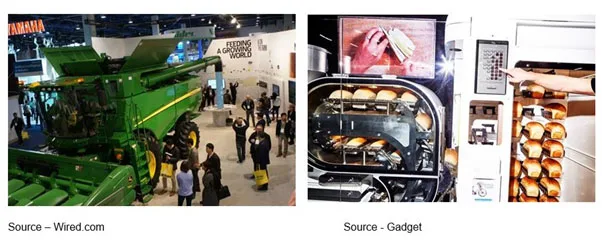
CES has become such an influential/influencer magnet that organizations like TU Automotive’s Consumer Telemetrics Show (auto stuff), MESA (Media & Entertainment Services Alliance) and dozens of others embedded a mini-show in the event.
Smart companies “leaked” their news before CES, so people could determine what sessions/companies they just had catch.
Not so smart folks embargoed their “news” until the first day of the show when thousands of break-through announcements also hit the wires and social media.
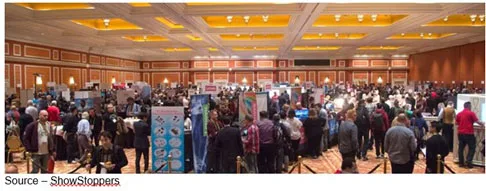
Since it is literally and physically impossible to see everything; CES Unveiled, ShowStoppers and two days of press conferences gave media folks a head start on the regular attendees with a buffet of news.
Bigger/badder TV sets, self-driving transportation, 5G, voice-activated and smart things/places, AI and a lot of stuff you didn’t even know you needed — or wanted – were on display in the miles of exhibit area (2.9M sq. ft), hidden away in a hospitality suite or both.
While Detroit and Paris vie for top automotive show honors, Las Vegas in January is the time where every vehicle manufacturer – car, motorcycle, scooter, tractor, etc. — focuses on making people think about the wonders that await them over the next few years.
China’s Byton showed why they hired some of the best engineers, designers, thinkers/futurists they could find in the auto/tech industry by unveiling the new K-Byte and M-Byte. They’ll hit showrooms in China in mid-year. Its UI (user interface) and interior cabin are…elegant.

Samsung’s Harman showed that they thought about people enjoyment in the vehicle no matter where they sit with practical and great-looking information and entertainment.
But at CES, it’s always about showing how technically progressive the vehicle firm is and Audi is eyebrow deep in designing for the future with technology for passenger and trucking vehicles. They’re already testing autonomous vehicles around the globe and were the first to say they will assume complete legal responsibility for the technology they put on the road.
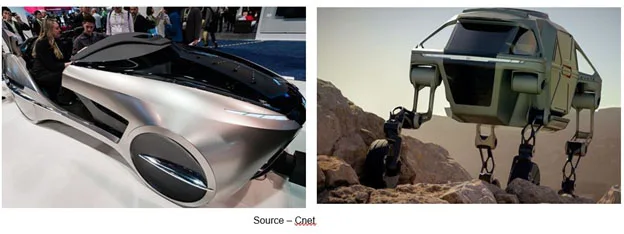
Sure, we expect to see a lot of sleek/sexy vehicles from Mercedes, Audi and BMW at the show, but Mitsubishi was a pleasant surprise, even though the show car will probably never be seen on the road.
Hyundai came out of left field with a real off-road vehicle called Elevator. Videos showed how you could enjoy the great outdoors in all kinds of weather, even heavy snow.
The major takeaway from CES is that the vehicle industry is putting a lot of time, money and effort into how people are going to get around tomorrow. They really want you to enjoy more time in your car or truck – lounge chairs, wrap-around movie/TV screens, AR/VR enjoyment on the go, voice control and vehicle-to-vehicle (V2V) and vehicle-to-everything (V2X) communication.
At CES 2025, they will probably be showing third-generation shipping units.
Content Viewing
CES has its roots in home entertainment and even though folks are increasingly walking around with entertainment screens in their hands, the companies still like to show off their big, beautiful TV screens.
There were a lot of new and impressive sets out of China but again, Samsung and LG got all of the initial attention.
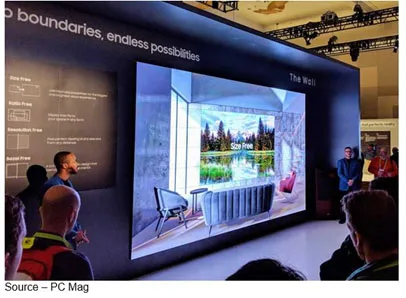
It was pretty hard for Samsung not to get noticed because they actually got The Wall built – 219-in, OTT connection, micro LED screen with 2,000 nits brightness – and it blends with its surroundings.
They had others all hyping 8K, which is really good; but since you’re only getting 4K from Netflix, Hulu and a few others, it begs the question.
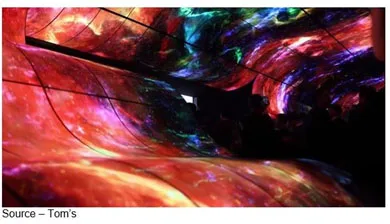
LG highlighted its newest flexible screens with a hallway demo, then showed off their 65-inch TV that rolls into a box when you aren’t watching something.
Since the home entertainment manufacturers now have a decent installed base of 4K sets, 98M plus units in 2018; it’s time to start hyping an even more beautiful screen, so they announced the formation of an 8K standards and education alliance.
Filmmakers have been shooting in 8K for some time now but backing the content down to 4K and even HD, so it can be shown/streamed.
Not sure our kids will really appreciate the improvements on their smartphones, but it will give us something to look forward to next year.
And while there was buzz everywhere about how good life/everything is going to be with 5G, folks will have to wait until the end of the year to be first in line to own a 5G handset.
Since almost everyone who wants one has a smartphone, expanding the market is becoming increasingly difficult and expensive.
So, the question is what do you show that makes people fork over a thousand bucks for a new phone to text with and post selfies on social media?
Yes, there were some tokens shown like the 5G hotspot devices shown by Netgear and Samsung; but other than that…soon.
But there were still plenty of phones shown with multiple high-resolution cameras and curved screen improvements.
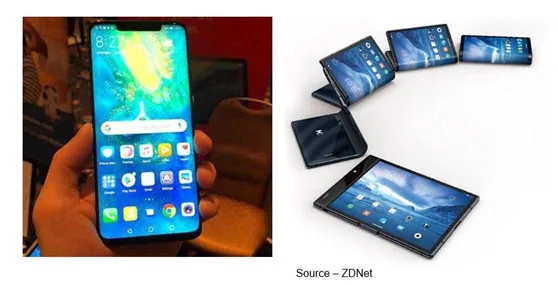
Huawei’s Mate 20 Pro featured a large three-camera system and very nice 6.30-inch curved OLED display.
Going head-to-head with Qualcomm’s Snapdragon processor, their eight-core Kirin 980 processor-based device also featured 6GB of RAM and 4200 mAh battery.
But the neatest unit shown was perhaps the Royale Flexpai that’s presently available in China and may be available in other parts of the world late this year.
The foldable smartphone unfolds to become a 7.8-in tablet display, so it really can become another 2-in-1 device. It may sound a little dumb; but like yesteryear’s phablets, there will be more, and they will find their place as kids get older and their eyes yearn for a bigger, better viewing screen.
Personal Attention
Just to reinforce that technology is really, really important in our lives, CTA’s boss, Gary Shapiro, noted that 511 companies exhibited in the show’s digital health category.
While the global birthrate keeps dropping, according to the World Bank, https://tinyurl.com/y7rxnsqx, it doesn’t mean people aren’t trying.

We can only guess that because people don’t want to waste their time doing things that don’t produce a positive result, there were a number of AI-enabled fertility/ovulation solutions that measured everything including resting pulse rate, skin temperature, breathing rate and other important parameters.
Some promoted better sensor performance, a vibrating alarm and with the premium version a consultation with a fertility coach.
Once phase one of the project was completed, parents could move along to something like the Owlet Band that wraps around Mom’s belly to monitor/track important things like the young one’s heart rate, kicks.
Or the Butterfly IQ ultrasound handheld scanner lets the couple follow the little tyke’s progress or maybe check Dad’s heart health when he finds out they’re having twins.
Wearables have come a long way from the basic workout band to smartphones, health trackers and remote patient monitoring devices.
According to Jupiter Research, the category is on course to be a $20B plus market by 2023, while a new category, assistive “hearables” or “connected” hearing aids will be $40B by 2022.
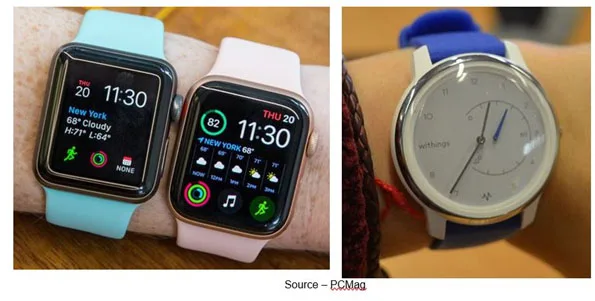
There was a 25 percent increase in the number of health tech folks at the show–all eager to appeal to the 74M boomers as well as millennials wanting to live a better life and use self-care gadgets.
Many looked like regular analog or digital watches that could monitor the heart and other health conditions with some enabling remote patient monitoring capabilities once they have FDA and CE clearance.
And inevitably, there were the tech-enabled clothes and undergarments to protect you from the ever-encroaching world.
The open question/concern is how will the data be used and shared.
Even though sales of computers have been sliding (again, folks who want ‘em, got ‘em and we’ve extended our replacement cycles) Dell, HP, Lenovo, Asus and Huawei rolled out some very sleek, light and powerful new ultralights as well as a number of gamer delights.

CES has become such a major gathering place for business and industry, IBM even unveiled its new quantum computer. It drew the attention of every engineer at the show and obviously, more than a few gamers could only imagine the possibilities.
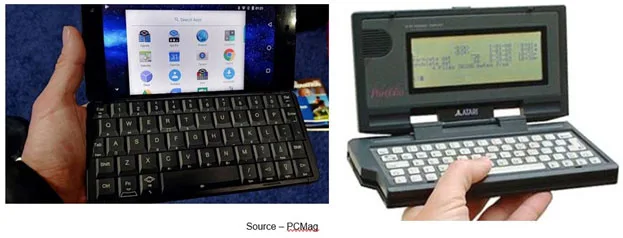
The unit that caught my eye was the Planet Cosmo that has an Android OS. Not that it was an outstanding piece of computing gear, but it really looked a lot like the Atari Portfolio, a palmtop we helped the company introduce back in ’89.
Portfolio was a PC-compatible unit that sold for $300. We dusted off one of the devices we still have, dropped in some AA batteries and yes, it still works!
Robots of every shape and size wandered the booths this year. Some friendly, some utilitarian, some just to follow you around through the store and carry your purchases for you.
The latter was “cute,” but we couldn’t figure out how you got him/her to the store to help you with the heavy lifting. Not real sure if Walmart is going to have a herd of them waiting for you when you enter the store to tag along just in case you found something you just had to have.
Folks love their pets, which is why they come up with every trick in the book to have them on the plane with them or while wandering the store with the LG Clio shopping cart following them.
In fact, according to the APPA (American Pet Products Association), they spent over $72B last year and will be a $202B plus business by 2025.

While we have Rocky, a 46-year-old African Grey, we didn’t see a thing on the floor he would be interested in. He might have liked to watch the updated Sony Aibo robot pup chase balls around the floor and pick up things; but at $3K, we passed.
But there were a lot of new privacy bathrooms for dogs/cats, exercise equipment for the pets, menu planners and delivery services. And, if you wanted a pet but were allergic, there was the AI-enabled grey fat cat pillow, complete with wagging tail.
As big as it was on the show floor, the smart home market was peanuts compared to the pet market – a measly $53.5B according to Statista by 2022.
There was something for every corner of your home, a lot of them AI enabled and a growing number you could talk to. Sure beats talking to yourself!
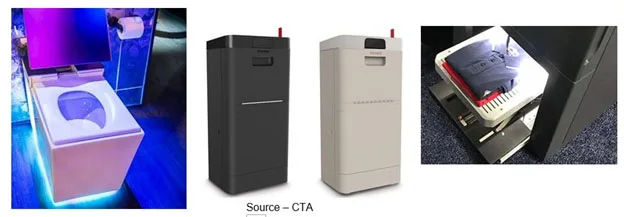
New beds that “read” if you had a rough day and adjust accordingly, toilets that would respond to your commands except for the final task that was left for you, faucets and appliances that did your bidding and kept track of your eating and more.
If your home wasn’t smarter than you by the time you finished your shopping at CES, you just weren’t trying hard enough.

But in our opinion, the best tech that was shown at CES this year was the Impossible Foods burger.
Since we haven’t eaten meat for 25-30 years, we’ll take their word for it that it has the flavor, aroma and beefiness you’d get from meat. All we know is that people said it was delicious.
Finally, something we could really sink our teeth into at CES and something that proved CTA’s Gary Shapiro’s opening remarks for the show were right, “Consumer technology is everywhere, touches everything today.”
Unfortunately, the show was overshadowed this year by the U.S. government shutdown which prevented a lot of government speakers from attending the show to see how technologies will change the landscape and exchange ideas/information with the global attendees.
The shutdown also created havoc for everyone at the show as we headed home because of the TSA blue flu.
Next year, CTA may enlist IBM’s Project Debater to help smooth the path for exhibitors and attendees. Project Debater uses a combination of machine and deep learning to capture the best arguments and true facts on a subject and helps people arrive at a solution quickly, easily, painlessly.
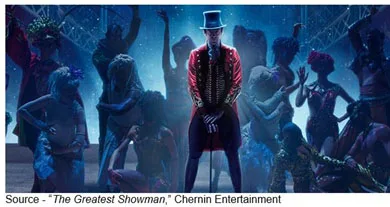 As with all the new AI-labeled stuff though, we need to keep in mind what IBM’s chief Ginni Rommety cautioned during her keynote, “Like all powerful tools, we’ve got to usher them in safely into society.”
As with all the new AI-labeled stuff though, we need to keep in mind what IBM’s chief Ginni Rommety cautioned during her keynote, “Like all powerful tools, we’ve got to usher them in safely into society.”
But Shapiro and his team agree with P.T. Barnum, “Nothing draws a crowd quite like a crowd.”
# # #